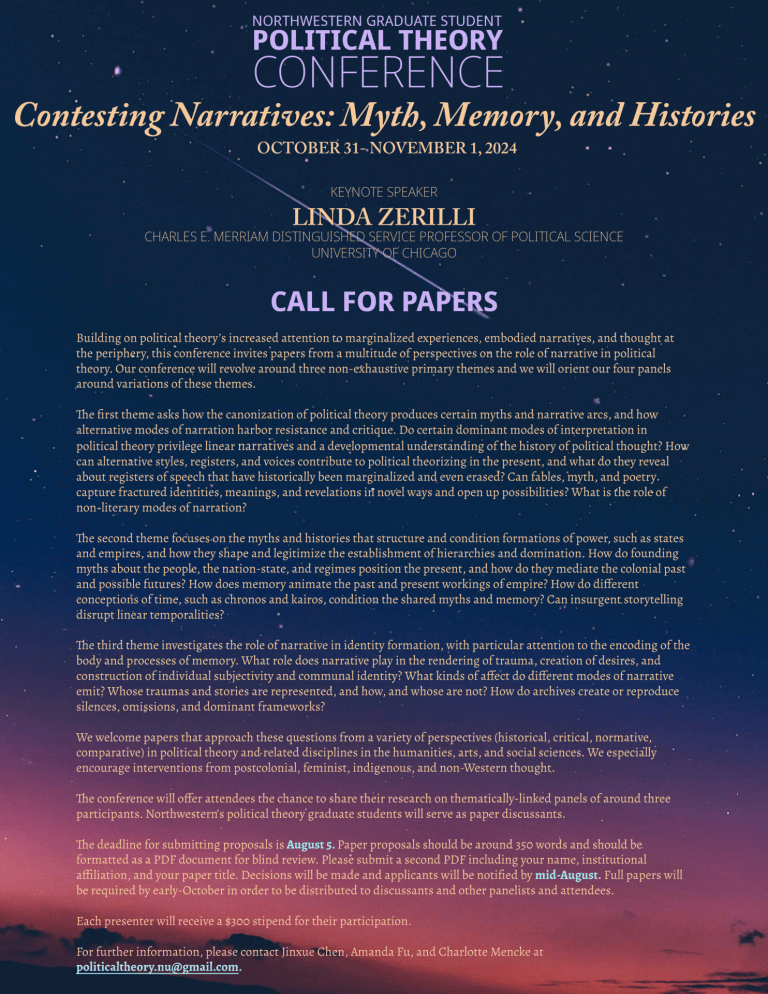CFP: Northwestern Graduate Student Political Theory Conference 2024

Political Theory Conference 2024
The Northwestern Graduate Student Political Theory Conference is a biennial conference that invites graduate students and a keynote speaker to convene with the Northwestern political theory community around a given theme. Details of past conferences can be found here.

Contesting Narratives: Myth, Memory, and Histories
October 31–November 1, 2024, Scott Hall, Room 212
Keynote speaker: Prof. Linda M.G. Zerilli, University of Chicago
Call for papers
Building on political theory’s increased attention to marginalized experiences, embodied narratives, and thought at the periphery, this conference invites papers from a multitude of perspectives on the role of narrative in political theory. Our conference will revolve around three non-exhaustive primary themes and we will orient our four panels around variations of these themes.
The first theme asks how the canonization of political theory produces certain myths and narrative arcs, and how alternative modes of narration harbor resistance and critique. Do certain dominant modes of interpretation in political theory privilege linear narratives and a developmental understanding of the history of political thought? How can alternative styles, registers, and voices contribute to political theorizing in the present, and what do they reveal about registers of speech that have historically been marginalized and even erased? Can fables, myth, and poetry capture fractured identities, meanings, and revelations in novel ways and open up possibilities? What is the role of non-literary modes of narration?
The second theme focuses on the myths and histories that structure and condition formations of power, such as states and empires, and how they shape and legitimize the establishment of hierarchies and domination. How do founding myths about the people, the nation-state, and regimes position the present, and how do they mediate the colonial past and possible futures? How does memory animate the past and present workings of empire? How do different conceptions of time, such as chronos and kairos, condition the shared myths and memory? Can insurgent storytelling disrupt linear temporalities?
The third theme investigates the role of narrative in identity formation, with particular attention to the encoding of the body and processes of memory. What role does narrative play in the rendering of trauma, creation of desires, and construction of individual subjectivity and communal identity? What kinds of affect do different modes of narrative emit? Whose traumas and stories are represented, and how, and whose are not? How do archives create or reproduce silences, omissions, and dominant frameworks?
We welcome papers that approach these questions from a variety of perspectives (historical, critical, normative, comparative) in political theory and related disciplines in the humanities, arts, and social sciences. We especially encourage interventions from postcolonial, feminist, indigenous, and non-Western thought.
The conference will offer attendees the chance to share their research on thematically-linked panels (see above) of around three participants. Northwestern’s political theory graduate students will serve as paper discussants.
The deadline for submitting proposals is August 5. Paper proposals should be around 350 words and should be formatted as a PDF document for blind review. Please submit a second PDF including your name, institutional affiliation, and your paper title. Decisions will be made and applicants will be notified by mid-August. Full papers will be required by early-October in order to be distributed to discussants and other panelists and attendees. The aim of the conference is to give graduate students working in the field of political theory broadly conceived an opportunity to present and receive feedback on their projects from peers and build a wider community of graduate political theorists across North America and beyond. We are planning to hold the conference completely in person with a zoom option for online audience.
Each presenter will receive a $300 stipend for their participation.
For submission and further information, please contact Jinxue Chen, Amanda Fu, and Charlotte Mencke at [email protected].

